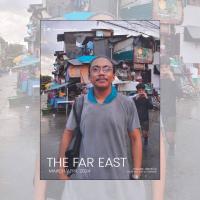
Michael Javier relaxing at the seaside on Chile's rugged and picturesque coastline. Photo: Michael Javier
I went to Chile from the Philippines as a newly minted lay missionary six years ago, knowing little of the Spanish language, the culture or way of life of the Chilean people. I remember at my commissioning Mass in my home parish, a priest asked me why I was leaving my native land for a foreign country. I replied, “I know Chile is a land of greater abundance than the Philippines, but I am sure there is still a need for mission there.”
In truth, I had no idea what that need may be, but looking back over many years I have come to understand the great value of sharing my faith, my talent and my own culture with those from quite a different background from myself. I think I can call that sharing myself with others. I also learned that despite the abundance of wealth in Chile, many are denied their rightful share.
A swathe of people in the Columban parish where I worked in Santiago, the capital of Chile, certainly lived with material poverty. However, there was also loneliness, abandonment, injustice and ignorance.
For me, my years in Chile were a lesson in the richness each person can contribute when they band together as a group. They experience the richness of each other, of those who surround them. Material wealth can never equal the satisfaction of supporting each other and journeying together.
Reaching the point where I could experience this in my new surrounds was a long journey. When I first arrived, I lived with a Chilean family, gaining not only the new words I thirsted for so ardently, but also an understanding of the culture I was being immersed in. At the dinner table, we shared stories about our homelands, the types of food we had in common, the way we cook or prepare them, family life and how we live and work.
The family usually gathered late at night for supper before going to bed. The fare was tea and a quintessential Chilean bread called maraquetta. Sometimes referred to as whipped bread, it has a high protein content, which enables gluten to form and ensure a good leavening. It has a spongy texture and crispy crust.
The family was also solicitous of each other’s welfare, greeting each other with a “how are you?” and a hug each day. Even in the early days when I could not speak or understand much, I felt comfortable in that family, and the love and care they lavished on me helped me feel at home in my adopted country.
However, even at the end of my language course, when I could speak and understand a fair bit, I lacked the confidence to talk. I was afraid to speak to the parishioners, fearful of making mistakes. Little by little, my confidence improved and when people actually did understand me and engage in a conversation, I had a feeling of elation.
Naturally, some laughed at me and even criticised my stumbling attempts. I felt uncomfortable and embarrassed, but in retrospect, they also helped me to learn. However, understanding the dynamics of the parish was a much bigger challenge than merely understanding the words people spoke.
The few that did attend Mass were mostly elderly. I was asked to spend time with them. I learned some were abandoned by their own children and relatives. Many of them lived alone and quite a few were ill. I felt that those with families that stayed with them were greatly blessed.
I began to question these elderly people as to why their children and grandchildren did not darken the doors of the church. They gave a variety of reasons, some going back to the time of the military dictator, Augusto Pinochet, when they felt the Church often abandoned them in their resistance to the harsh laws introduced during his rule. I could relate to what they said, as many of the reasons they gave were similar to the situation in my own country.
I gave the bulk of my years in the parish to working with the young people that did come and take part in the parish activities. I tried to apply what I had learned during my own younger days in the Philippines and find ways to involve them in the various apostolates of the parish more deeply. I also visited people in their homes. Getting to know families in this way taught me much and had a deep impact on the way I thought about myself and the mission I had undertaken.
My other discovery was that many families employed Filipinos as nannies and domestic workers, and did not always treat them with justice or fairness. Often, the mostly female workers had to bargain for their wages and at times were even denied food. Employers took advantage of their inability with the Spanish language, so I began to teach them what I could in order to give them at least some voice with their employers.
My years in Chile have come to an end now. Nevertheless, I can look back with satisfaction at what I believe I achieved there and am happy with the knowledge that I learned much that has helped me to be a more constructive member of the Columban Lay Missionaries. It was a great preparation for my next challenge as a lay missionary in the Union of Myanmar.
Columban lay missionary, Michael Javier, is assigned to Myanmar. He currently works on mission in his home country of the Philippines.
Listen to "The taste still graces my mouth"
Related links
- Read more from The Far East - January/February 2022

